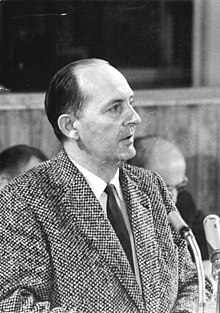Robert Havemann
Robert Havemann | |
|---|---|
 Havemann in 1960 | |
| Born | 11 March 1910 |
| Died | 9 April 1982 (aged 72) |
| Alma mater | Kaiser Wilhelm Institute |
| Spouse(s) | 1: Antje Hasenclever 1934 2. Karin von Trotha 1949 3: Annedore Grafe 1974 |
| Scientific career | |
| Fields | Chemistry |
Robert Havemann (German: [ˈʁoːbɛʁt ˈhaːvəˌman] ⓘ; 11 March 1910 – 9 April 1982) was an East German chemist and dissident.
Life and career
[edit]| Righteous Among the Nations |
|---|
 |
| By country |
He studied chemistry in Berlin and Munich from 1929 to 1933, and then later received a doctorate in physical chemistry from the Kaiser Wilhelm Institute.
Havemann joined the Communist Party of Germany (KPD) in 1932 and was one of the founders of the resistance group, European Union. It was in connection with this group that he was arrested by the Gestapo in 1943. He received a death sentence for treason, but his execution was continually postponed because of the intervention of former colleagues, who insisted that Havemann was as important due to his work on chemical weapons and that he was still needed to explain the research. His execution was postponed so many times, he was able to survive until the Brandenburg-Görden Prison was liberated by the Red Army.[1][2]
After the war, he became head of administration in the Kaiser Wilhelm Institute for Physical Chemistry and Electrochemistry in Berlin, but in 1948 he was dismissed from this position due to political pressure from the American authorities in West Berlin. He continued his scientific work in the institute until he got barred from his laboratory in January 1950.
He then became a professor of physical chemistry at the Humboldt University of Berlin. He became a member of the Volkskammer in 1950 and won one of the GDR's national prizes in 1959. He published articles in Sinn und Form criticizing modern socialism and revisionist works of the Western authors.[3]
In 1963 he lectured on 'Scientific Aspects of Philosophical Problems' (published as 'Dialectic without Dogmatism—Natural Sciences against Communistic Ideology') and was expelled from the ruling Socialist Unity Party and dismissed from the University—officially because he gave an interview to a newspaper from West Germany.
His son Florian Havemann (born 12 January 1952 in East Berlin) fled to West Germany in 1971.
Havemann was a victim of the Stasi's Zersetzung psychological warfare program.

He continued his work as a socialist critic and was put under house arrest in 1976, at his home in the village of Grünheide. This continued until his death in 1982, after a long time suffering from lung disease.
In 1989 he was politically rehabilitated by the Socialist Unity Party of Germany's Central Party Control Commission.
In 2005, Havemann was awarded the title Righteous among the Nations by the Israeli Holocaust memorial, Yad Vashem.[4]
References
[edit]- ^ Bernd Florath. "Die Europäische Union," essay in Johannes Tuchel, Der vergessene Widerstand — zu Realgeschichte und Wahrnehmung des Kampfes gegen die NS-Diktatur, pp. 114-139. (2001) Wallstein Verlag. ISBN 978-3-89244-943-0 (in German)
- ^ Claudia Keller. "Späte Ehre für die selbstlosen Retter" ("Late Honor for the selfless Lifesaver") Der Taggespiel (6 July 2005) Retrieved 16 March 2010 (in German)
- ^ McAdams, A. James (1985). East Germany and Detente. Building Authority after the Wall. Cambridge: Cambridge University Press. p. 44. doi:10.1017/cbo9780511521874. ISBN 978-0-521-26835-6.
- ^ "Israel honours memory of anti-Nazi 'European Union'"[permanent dead link] Reuters (20 June 2006) Retrieved 17 March 2010
- Havemann, Robert (2009). Morgen. BoD. pp. 187–188. ISBN 978-3-8391-3657-7.
External links
[edit]- Official website of the award winning film The Burning Wall Archived 22 April 2012 at the Wayback Machine
- Hartmut Jäckel. "Der Dissident der aus der Kälte kam" ("The dissident who came out from the cold") Die Welt (10 March 2010). Retrieved 18 March 2010 (in German)
- Robert Havemann – his activity to save Jews' lives during the Holocaust, at Yad Vashem website
- 1910 births
- 1982 deaths
- Scientists from Munich
- Scientists from the Kingdom of Bavaria
- Communist Party of Germany politicians
- Socialist Unity Party of Germany politicians
- Members of the Provisional Volkskammer
- Members of the 1st Volkskammer
- Members of the 2nd Volkskammer
- Members of the 3rd Volkskammer
- Cultural Association of the GDR members
- 20th-century German chemists
- Colloid chemists
- East German dissidents
- Max Planck Institute directors
- Members of the German Academy of Sciences at Berlin
- Red Orchestra (espionage)
- Communists in the German Resistance
- German Righteous Among the Nations
- German prisoners sentenced to death
- Recipients of the National Prize of East Germany
- Recipients of the Patriotic Order of Merit in silver
- People convicted of treason against Nazi Germany
- People condemned by Nazi courts
- Academic staff of the Humboldt University of Berlin
